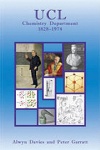Laurence Coupe, senior lecturer in English, Manchester Metropolitan University, has just read Nicholas Royle’s First Novel (Jonathan Cape, 2012). “Having only just finished it, I feel I ought to go back through it to make sure I’ve not missed a trick. This is an absorbing tale that mixes metafiction, mystery and murder. It’s certainly a gripping read, but it also arouses critical curiosity. I don’t usually like novels about writing novels, but I was hooked by this one.”

W. P. Griffith, professor emeritus of chemistry, Imperial College London, is reading UCL Chemistry Department 1828-1974 (Science Reviews 2000, 2013) by Alwyn Davies and Peter J. Garratt. “This endearing book concerns London’s oldest surviving chemistry department, from its 1828 opening to 1974. Many eminent people spent time there, including Sir Stafford Cripps (later Chancellor of the Exchequer), four Nobel laureates and numerous others. They are vividly recalled, with good anecdotes and a bountiful use of illustrations. Thoroughly recommended, both for UCL alumni and the general reader.”

Roger Morgan, formerly professor of political science, European University Institute, Florence, is reading John Eidinow’s Another Day (Acorn Digital Press, 2013). “This fast-moving novel takes its central character through the complexities of wartime London (including upmarket pro-Nazi circles and Soviet spy rings), as well as to battlefields in collapsing France and on other dramatic continental missions. The political and emotional interactions between exotic but credible characters, steeped in modern art and Russian literature, make this an absorbing and stimulating read.”

Becky Peterson, instructor in the department of cinematic arts, University of New Mexico, is reading Belly Dance Around the World: New Communities, Performance and Identity (McFarland, 2013), edited by Caitlin E. McDonald and Barbara Sellers-Young. “An important critical reaction to the popularity of belly dance practice around the globe, this collection features compelling essays by scholars speaking from inside and outside the Middle East. Using a range of methodologies, the contributors tackle topics such as body image, the Arab diaspora, global feminisms and the production of identity and community through technology.”

Peter J. Smith, reader in Renaissance literature at Nottingham Trent University, has just reread Philip Larkin’s A Girl in Winter (Faber, 1947). “Katherine works in a provincial library under the mean-spirited Mr Anstey. Her bleak routine is jolted by her reunion with an awkward teenage boyfriend. The novel alternates between a numbing Second World War winter and a perfect, peacetime English summer. The climactic meeting is as pensive, painful and poignant as any of Larkin’s poems: ‘They were going in orderly slow procession, moving from darkness further into darkness.’ An evocative and chilly meditation on the severity of loneliness.”

